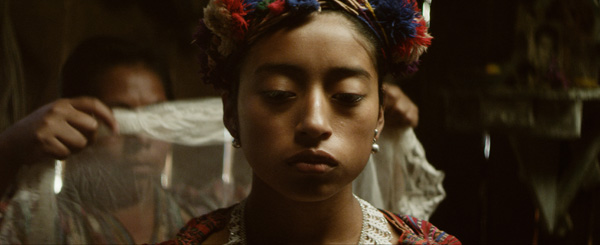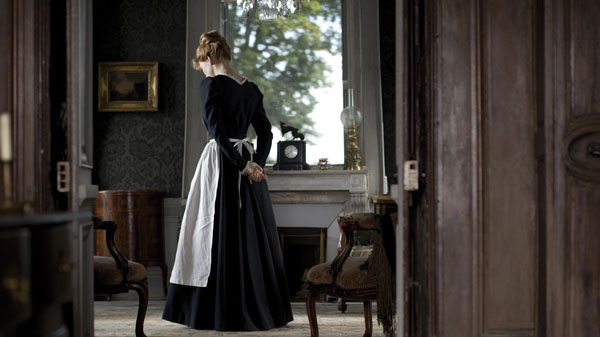We’d better get this out of the way first: Minus the six minutes of credits, Sebastian Schipper’s amazing Victoria is a single 134-minute shot. As seasoned moviegoers, we’re naturally inclined to look for “invisible” cuts, but Schipper insists that there are none: “On April 27th, 2014, we started the camera a little after 4:30am in a club we’d built ourselves (in order to keep locations close to each other), and after 2 hours and 14 minutes—after we’d run, walked, strolled and climbed through 22 locations, had more than 150 extras handled by 6 assistant directors and seven actors followed in succession by 3 sound crews—we were done—at 06:54 am.”
Now, if you’re going to pull a stunt like this, you’d damn well better dream up, construct and hone a project that warrants the gimmick. And Schipper, with his co-writers Olivia Neergaard-Holm and Eike Schulz, most certainly have. Victoria is an exhilarating experience, its tension setting in early before mounting to a nearly unbearable pitch, then subsiding and cranking up all over again.
I’m reluctant to say anything at all about the story since each of its turns is best kept a surprise, but this much is safe: Victoria, a young Spanish woman who’s been in Berlin for three months, dances the night away, downs a last shot and heads out of the club to open the nearby café where she works. Not more than a few steps away from the club’s door, she runs into four guys, echt Berliners, as they keep insisting, who urge her to party on with them, even if only for another drink or two. Are these guys on the up and up, as harmlessly fun-loving as they claim to be? Why does Victoria go along with them? Why does she make any of the decisions she makes over the next couple of hours?
There’s a moment further on when she explains quite clearly why she’s thrown her lot in with them, but let’s focus here on the execution of Schipper and his remarkable cast and crew. First up, credit for making the one-shot approach work must be given in large part to cinematographer Sturla Brandth Grøvlen. It’s not just that there are times when you can’t believe that the camera can possibly be existing in the same three-dimensional space as the action it’s capturing; the creative, ever-shifting framing, combined with the never-too-shaky handheld floating rouses an uneasiness in the viewer and establishes a chaotic world in which anything might happen at any moment. Contrast this with, say, Birdman, which, yes, only pretends to be comprised of a single shot, but that aside: All the action within each scene is so clearly choreographed and thoughtfully composed that we know throughout that we’re watching a show, a series of events presented to us that plays at chaos but glides smoothly from mark to mark. Not Victoria.
Casting directors Luci Lenox and Suse Marquardt have found five outstanding performers whose names and faces will likely be unfamiliar to most, another bonus that lends a shot of verisimilitude to a story that stretches the willingness of some critics I’ve spoken with to believe all that could happen in a single night. There’s more talent and fortitude in Victoria than we might imagine when we first meet her, and Laia Costa is more than up to the challenge. At one point, she’s called to, let’s say for purpose of avoiding spoilers, emote at considerable length. And it’s heart-wrenching, and convincingly heart-wrenching because, by this point, we’re attuned to events playing out in real time and it’s simply going to take Victoria as long as it would actually take anyone to work their way through this moment emotionally.
Frederick Lau, who plays one of the four in this tightly knit group of guys, deserves special mention as well, calling to my mind and others’ a young Brando, a young Truffaut, a young Belmondo—and there is indeed more than a little Breathless in Victoria.
I’ll stop here. But the two major highlights of this Berlinale so far are Jafar Panahi’s Taxi and Sebastian Schipper’s Victoria.
WHAT OTHERS ARE SAYING
Victoria is “undeniably a stunt, but one suffused with a surprising degree of grace and emotional authenticity,” writes Guy Lodge for Variety. “If Luc Besson had somehow been born the third Dardenne brother, the trio might have produced something like this heady, palpitating Berlin competition entry.”
“Padding out a minimal 12-page script with heavily improvised dialogue, Victoria takes a while to emerge from its fuzzy-headed, freewheeling first act,” finds Stephen Dalton in the Hollywood Reporter. “But it repays our patience when it shifts gear from Richard Linklater-style talk-heavy Eurodrama to heart-racing, adrenaline-pumped heist thriller.”
Victoria “has moments of real adrenalin and an engaging, if somewhat sentimental, view of proletarian male camaraderie, not to mention the buzz of a tender love story that (no mean feat) traces a reasonably satisfying dramatic arc,” writes Lee Marshall for Screen.
Update, 2/11: Cineuropa runs an enthusiastic review by Bénédicte Prot and a video interview with Schipper (11’16”).
Updates, 2/15: “It’s the kind of story where you have to discount mounting implausibilities and go with the energy and emotion, and if you do the tension becomes almost unendurable,” writes Sight & Sound editor Nick James.
Jack Howard interviews Schipper for the Berlin Film Journal.
And cinematographer Sturla Brandth Grøvlen has won one of two Silver Bears for Outstanding Artistic Contribution presented this year.
Updates, 2/21: For Jessica Kiang at the Playlist, “the virtuosity of the direction and performances, which have to stay in the moment, hitting their marks throughout the entire runtime (oh, imagine fucking up in the final minutes?), is second only to that of the cinematographer, who had to be everywhere they are, all while lugging a camera and trying to keep the right bits in frame and in focus…. Schipper, Grovlen and the cast shot the film three times over, and the last take is the one we see here in its entirety and my amazement now is not that they can have achieved something so polished in just three tries. It’s that they can have lived that ridiculous night three whole times—from a stationary, seated position, I watched it just once and I am exhausted.”
Deadline‘s Nancy Tartaglione reports that Adopt Films “has taken all U.S. rights and plans a late summer/early fall 2015 release.”
I walked into Jayro Bustamante’s Ixcanul Volcano cold and came away somewhat impressed, but there are at least a couple of items I gleaned from the press kit I picked up afterwards that it might have been helpful to know going in. Helpful, but not necessary for an appreciation of the film overall, and specifically: Luis Armando Arteaga’s cinematography, rich in deep blacks and vibrant colors; the unique beauty of María Mercedes Croy, who plays a 17-year-old about to enter an arranged marriage; the all-in performance of María Telón as her mother.
Where we are exactly is never specifically mentioned, though one young man who dreams of running off to the United States, land of big houses with gardens, does note that he’ll have to cross two rivers, a desert and all of Mexico to get there. So, Central America. Turns out, it’s the Guatemalan highlands, where descendants of the Maya toil on the coffee farms and work the soil made fertile by semi-dormant volcanos.
One might also want to know that Guatemala, with a population of only 14 million, has “become the first exporter of children in the world,” as Bustamante notes in his director’s statement. Also: The producers have been working closely for years with the Mayan communities on “expression workshops,” film and theater courses, and Ixcanul Volcano has in part sprung from this cooperation.
The daily lives of Mayan farmers, including María, an only child, and her parents, are drenched in ancient customs that include regular offerings to the volcano. They’re also at the mercy of the whims of Ignacio (Justo Lorenzo), who owns the land—and hopes to marry María sooner rather than later. María has a pretty clear idea of what her future holds—endless household chores and child-bearing—but spectacularly poor judgement as to what to do about it.
Her choices lead, in the last twenty minutes or so, to an emergency run to a hospital in a distant city, a sequence the pulls the rug out from under the previous hour. In a good way. After an hour spent in a remote landscape that, with the exception of a few items of clothing and the occasional mention of smart phones we never see, seems untouched by the contemporary world, we’re suddenly plunged into the here and now as most of us sitting in the Berlinale Palast (or reading these words on the screen of your choice) know it. Here, the sight of Ignacio as a nobody with no pull whatsoever as María’s hangs in the balance is a jolt of mixed emotion.
WHAT OTHERS ARE SAYING
“Bustamante’s film is downright Herzogian (far more than Herzog’s own Queen of the Desert) in its surfeit of physical detail, observed ritual and looming clash of civilizations,” writes Variety‘s Scott Foundas. “What emerges, finally, is a film that gives an urgent, original voice to a people too frequently marginalized in both movies and society at large.”
“First-time director Bustamante steers a steady course, mostly avoiding ethno-arthouse clichés by focusing on characters, especially the mother and daughter who are the sympathetic focus of this sensitive, male-directed women’s film,” writes Lee Marshall for Screen.
Update, 2/15: Michael J. Anderson: “Bustamante, in the end, does not attempt to reinvent cinema here, so much as he seeks and succeeds in introducing daily life and beliefs—from the mouths of the locals, so to speak—in a corner of the planet unmolested by globalism. With Ixcanul, Bustamante may just have laid claim to the role of Guatemala’s resident art house voice.”
And David Perrin interviews Bustamante for the Berlin Film Journal.
Ixcanul Volcano has won the Silver Bear Alfred Bauer Prize, presented for a feature film that opens new perspectives.
Updates, 2/21: For BFI programmer Geoff Andrew, “the film lurches briefly towards melodrama before recovering its balance as a low-key, deftly observed slice of realism. The excellent performances are crucial, and the relationship between mother and daughter is especially well handled.”
“This was the central American nation’s first contender for top honors at one of Europe’s ‘big three’ cinema showcases (Berlin, Cannes, Venice),” notes Neil Young. “And it didn’t go home empty-handed: the debut feature from 37-year-old Bustamante… took the Alfred Bauer Prize…. The elephant in the room is that ordinary Guatemalans (especially downtrodden indigenous peoples) like their kin in so many poorer nations, simply have no way of making viewable films given the current, screamingly unequal systems of finance, exhibition and distribution which prevail across the globe.”
Benoît Jacquot gets at least one thing right in his adaption of Octave Mirbeau’s 1900 novel, Le Journal d’une femme de chambre. If you need a Célestine who proves irresistible to absolutely everyone, young and old, gorgeous and repugnant, cast Léa Seydoux. Otherwise, the challenge facing Jacquot can be summed up in the question, After adaptations by Jean Renoir (1946) and Luis Buñuel (1964), does the world really need another Diary of a Chambermaid? Short answer: Not this one.
The gist of the 2015 version is that Célestine is an early 20th century working class heroine. Merely muttering insults under her breath at the bourgeois fops and fading ladies she serves won’t do, of course. She’ll need to pull off a properly rebellious coup, and the fact that she does so in cahoots with a radically conservative anti-Semite (the manservant Joseph played by Vincent Lindon) is evidently a putrid can of worms to be dealt with outside the framework of this telling.
Jacquot scrambles chronology a bit here and there to pinpoint the origins of this or that aspect of Célestine’s drive to determine her own fate and he pulls the occasional rapid zoom for whatever reason, but all in all, Diary, surprisingly, just doesn’t warrant much more attention.
WHAT OTHERS ARE SAYING
“However much Romain Winding’s camera lingers on Lindon’s glowering gaze and Seydoux’s knowing half-smile, there isn’t enough heat between these fine actors to convey even a compromised sexual fascination,” writes Guy Lodge for Variety. “As in Farewell, My Queen [2012], Jacquot’s revisionist approach extends to his deromanticized aesthetic: Katia Wyszkop’s production design is more sparsely appointed than you’d customarily expect in a film of this nature, while Anais Romand’s sumptuous costumes are coldly embraced by Winding’s lensing.”
Dan Fainaru for Screen: “Unlike Bunuel’s 1964 sexually acerbic Jeanne Moreau starrer and Renoir’s earlier, Hollywood-made, romantic 1946 version with Paulette Goddard—both self-sustained coherent adaptations which fit the point of view, vastly different in each case, of the two directors—Jacquot’s script (written with Helene Zimmer) of Diary of a Chambermaid offers no new insights, while his direction decoratively stumbles over a collection of cardboard characters bound to leave most present day audiences indifferent.”
“If Chambermaid lacks the dramatic push to carry it through to the end, Seydoux’s performance remains robust and engaging throughout,” writes Jordan Mintzer for the Hollywood Reporter. “Other turns are solid, though the various class caricatures never feel like anything more than walking Honoré Daumier sketches, which most likely is how Mirbeau preferred them.”
“This is a minor, flawed movie, but watchable in its suppressed, pornographic melodrama,” finds the Guardian‘s Peter Bradshaw.
Elsa Keslassy talks with Jacquot for Variety, where John Hopewell reports that the Cohen Media Group has acquired North American rights.
Update, 2/11: More from Jessica Kiang (Playlist, C-) and Bénédicte Prot (Cineuropa).
For news and tips throughout the day every day, follow @KeyframeDaily. Get Keyframe Daily in your inbox by signing in at fandor.com/daily.






